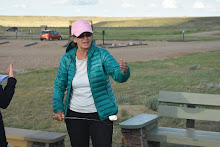Paul worked all day Saturday to complete the installation. First the brackets and hinges had to be installed on each panel. Next each panel was placed on the roof of the trailer and secured with 12 rivets to make sure they don't come loose when we are going down the highway at 70 mph.
Next each panel was wired and connected to the solar charger, which then controls the rate of energy flow so our batteries stay healthy.
We can tilt our panels which is helpful in the winter months and increases their production by about 30% as compared to leaving them flat on the roof.
All panels in place. Note the high quality window covering on the rear window. Looks a little "red-neck" to me.
Panels in the closed, riding position. If we are able to camp with the front of the trailer facing west then the panels do not have to be tilted since they would already face south at an angle.
That's it, fully wired and living off grid. I will report back in a few weeks as to how everything works. As for now we are happy to be living with solar and without the aid of a generator.
Our system: 3 - 130 Kyocera Solar panels, 4- 6 volt Trojan Batteries, Morningstar TriStar Solar Battery Charger with Temperature Sensor, Prowatt SW 2000 Sine Wave Inverter, IOTA Power Converter/Battery Charger, plus wire, fuses, clamps, battery box, hydrometer,
Sunday, 27 March 2011
Subscribe to:
Post Comments (Atom)





Purchasing an inexpensive DIY solar power kit is a little bit of an investment in the beginning, but once it is up and running it will save you a lot of money.
ReplyDeleteSolar energy is one of a rapidly enhancing technology, thus, it is reasonable to suppose that there are chances to address the issue of cadmium contamination.